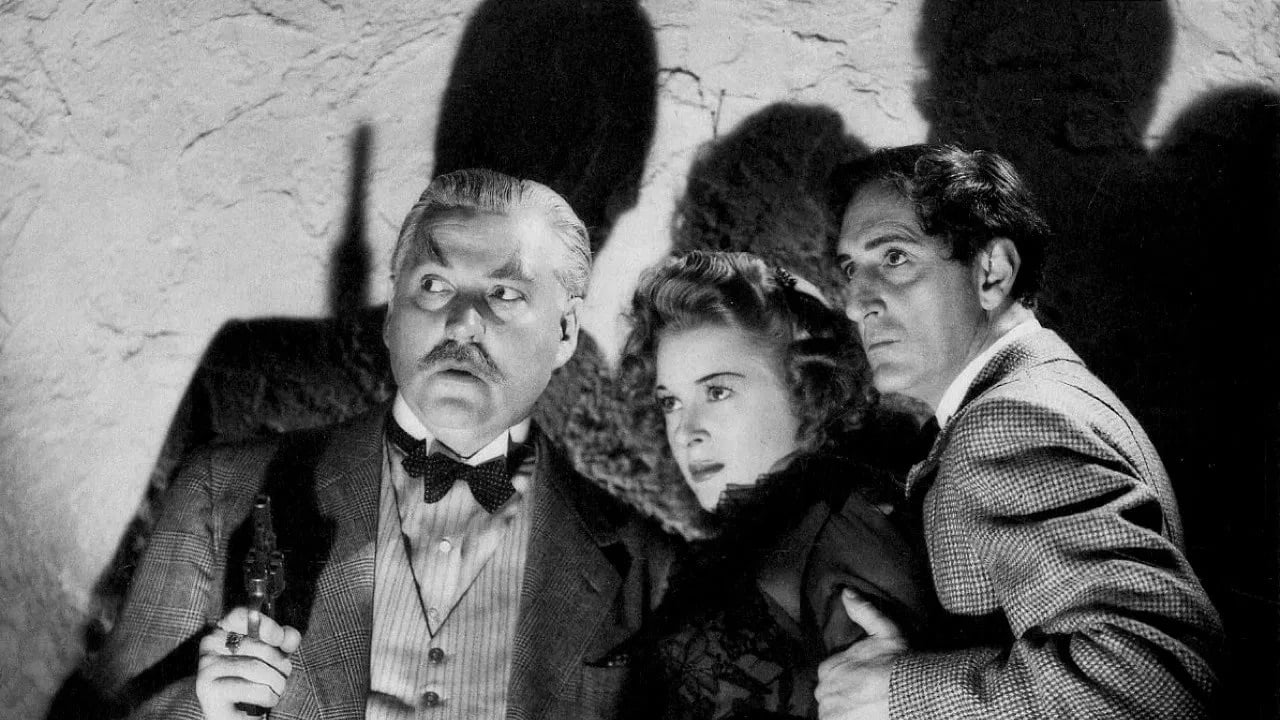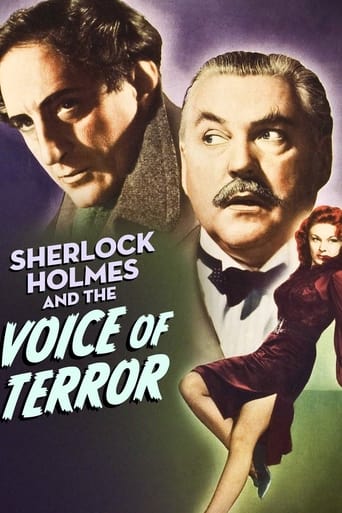SmugKitZine
Tied for the best movie I have ever seen
Mjeteconer
Just perfect...
Smartorhypo
Highly Overrated But Still Good
Benas Mcloughlin
Worth seeing just to witness how winsome it is.
Leofwine_draca
SHERLOCK HOLMES AND THE VOICE OF TERROR is the third of the Basil Rathbone series and the first to be made by Universal rather than 20th Century Fox. The Universal films were lower budgeted and had shorter running times, and they also updated the stories to the then-present day with no explanation. Thus we get Holmes and Watson tackling Nazis rather than the classic Conan Doyle villains.This story is a mixture of bits from the written story HIS LAST BOW along with a fictional version of the infamous 'Lord Haw Haw' Nazi broadcaster. It doesn't take long for Holmes to find himself on the trail of the scheming villain, and there are plenty of atmospheric touches along the way and a few exciting shoot-outs. Henry Daniell and Evelyn Ankers co-star. Given that this was made during the war, expect lots of sentimental chest-thumping and propaganda moments.
Goingbegging
Even the date says a lot - September 1942, the dark before the dawn, as the world wondered whether it would ever know freedom again. And into this grim atmosphere, the producers must still try to inject believable propaganda on a shoestring.Reviving Sherlock Holmes and Doctor Watson for World War II might seem laughable to us now, but when the film ends with Holmes saying "Good old Watson, the one fixed point in a changing age", he is providing what the public desperately needs: fixed points by the bucketload. That word 'elementary', repeated so often, you think Holmes must have got a stutter. The statutory crisis, with "Watson, there's not a moment to lose!" And then, Holmes pointing out the villain's careless mistakes, just as though it was Baker Street in 1890. This could have been a hack job, with no budget for colourful locations or grand costumes. But they exploit their limits by turning it into a drama of the airwaves, clearly referencing the controversial English-language broadcasts from Germany by Lord Haw-Haw (the one who prodded Mosley into going the Hitler route), and the radio-set becomes the star of the show for many long minutes. The mysterious announcer has acquired a terrifying new credibility, predicting attacks on the UK, which follow almost at once. It is left to Holmes to deduce that these broadcasts are not what they seem, and that there is treachery at the top. Only the unmasking of the villain, with a little piece of sub-plot involving plastic surgery, somewhat stretches credulity.Although Basil Rathbone and Nigel Bruce are stuck in their cliché double-act, with creative effects firmly ruled out, there are some surprisingly good performances by the others, especially Thomas Gomez, an unlikely New York Hispanic in his first film (at thirty-seven), acting as an enemy agent, linked to the London underworld, where patriotism is thin on the ground. And when the intelligence team comes under scrutiny, the sinister cad Henry Daniell makes a too-obvious suspect, as events prove.
binapiraeus
Three years after the last one of the Basil Rathbone 'Holmes' movies had been made (it had been stopped by 20th Century-Fox when the War began, because now there was no more time for reminiscence of the Victorian Age and simple murder cases), Universal took over Rathbone and Bruce and carried on with the series - but any similarity to the former films, the former Holmes (even though being played by the same actor), and even the novel its first movie is loosely based on (a spy story, but from WW I, of course) is purely coincidental.Sherlock Holmes is suddenly being transfered via time machine into 1942 London, where the 'Voice of Terror', the Nazi German radio broadcast, almost every day predicts a horrible incident in England that's happening right at this very moment - and those incidents can only be made possible by the well-known 'Fifth Column', the Nazis and their British collaborators hiding all over England.So, Holmes is called in by the government council himself to bring some light into the whole thing - and on the same night, a man is killed right on his doorstep by a knife thrown in his back from a distance; the last thing he manages to utter is "Christopher", and the knife, as Holmes deduces, might have its origins in the 'Limehouse', the most shady district in town.At least, the film gives the credit to the 'lowly' people living in the Limehouse for being a vital help in extinguishing this spy ring, and (as we suspected right from the start; it isn't difficult THIS time to follow Mr. Holmes' thoughts...) a member of the highly respected government council turns out to be one of the traitors; all the rest is pure war propaganda, just like hundreds of other Hollywood movies of the time - only that this one even uses the famous name of Sherlock Holmes to attract more attention...
BA_Harrison
It's 1942 and the inner council of the British War Cabinet are struggling to 'keep calm and carry on' thanks to The Voice of Terror, a German radio broadcast that announces Nazi acts of sabotage in mainland UK, striking fear into the heart of the British. Who can the top brass call upon in these troubled times? Why, Sherlock Holmes (Basil Rathbone) and his best bud Watson (Nigel Bruce), of course!During the Second World War, every man was expected to do his part for queen and country, even Britain's greatest Victorian detective—which is why this third adventure for Holmes and Watson features a contemporary setting, allowing the pair to lend their incomparable deductive abilities to thwart the Third Reich. Sadly, while this thinly disguised propaganda no doubt rallied the nation back in the day, now it all comes across as rather crude, with characters pausing mid-action to give rousing patriotic speeches and even the lowly criminal class displaying some bulldog spirit to bash the Nazis.While Voice of Terror is commendable stuff as far as helping to build morale is concerned, it's far from the most satisfying outing for Conan Doyle's creation, lacking the appeal, atmosphere and intrigue of Rathbone's earlier on-screen cases.

